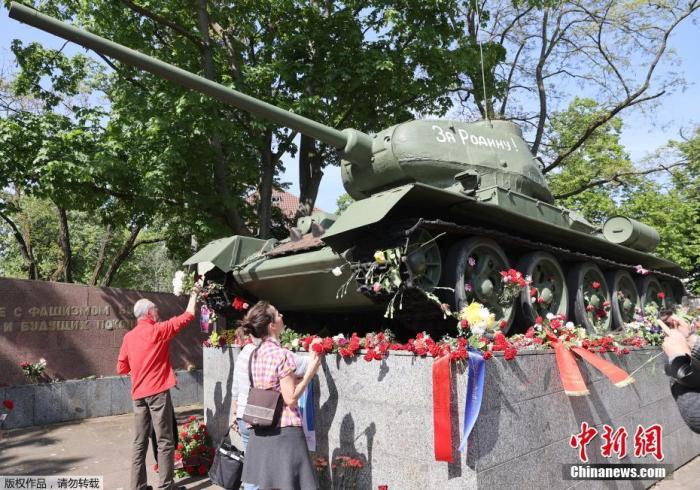The 75th anniversary of the end of World War II in Germany during the epidemic: "Loneliness seems like 1945 at the moment"
China News Agency, Berlin, May 8 (Reporter Peng Dawei) On May 8, 1945, Nazi Germany surrendered. Today, 75 years later, Germany originally planned to use a grand ceremony to commemorate the liberation of the country from the Nazis and the official cessation of the World War II European battlefield. The outbreak of the new crown epidemic caused people to ignore most of it. Memorial plan.
At noon on the 8th, the German President, the Chancellor, the Speakers of the upper and lower chambers of the Federal Parliament and the President of the Federal Constitutional Court came to Berlin's new sentry post to commemorate the victims of war and tyranny.
Compared with the previous grand commemorative event planned to be held in front of the Reichstag with 1,000 spectators and 500 young people from various countries, only German President Steinmeier delivered a speech on the square without an audience. The heads of the other four German constitutional institutions sat on both sides of Steinmeier, separated by a distance of more than 1.5 meters in accordance with the requirements of epidemic prevention.
On May 8, local time, Berlin, Germany, the German iconic Brandenburg Gate projected "Thank you" in various languages to commemorate the 75th anniversary of the victory of World War II.
Steinmeier said that the epidemic forced Germany to celebrate alone, "cannot be with those who are very important and grateful to us."
"The loneliness at this moment may allow us to return briefly to May 8, 1945. At that time, the Germans were really alone." Steinmeier said. At that time, Germany was under military occupation, and politics and economy fell At the bottom, morally complete bankruptcy. "We used to make ourselves hostile to the whole world."
After the war, Germany began to liquidate and reflect on the crime, and it continues to this day. The official website of the German Chancellery stated on the same day that the last six years of war claimed more than 60 million lives, including about 6 million Jews. "Always keep the memory of the war and its disastrous consequences from falling asleep, and Germany takes it as its own task."
"Never forget the tens of millions of victims and immeasurable suffering caused by the war launched by the Nazi regime." The article wrote.
At the German-Russian Museum in Berlin, Germany, on May 8, local time, people laid flowers beside a tank.
According to the “Unblocking” arrangement in Berlin, the German History Museum next to the new outpost will reopen on the 11th. The first physical exhibition to reopen is "Hannah Arendt and the 20th Century".
Arendt, a Jewish thinker, went to Israel to report on the trial of Nazi executioner Eichmann. She later explored the connection between "trivial evil" and the Holocaust in her work. Gross, director of the German History Museum, described Arendt "asking about what historical insight can do after the Holocaust."
Another permanent exhibition in the museum is online showing manuscripts written by the Jewish woman Scheindi Ehrenwald after the Nazi occupation of Hungary in 1944. Lines of text record the cruel persecution of the Jews by the Nazi army. The family of Scheindi Ehrenwald was later transported to the infamous Auschwitz concentration camp. Her grandparents, parents and sisters all died in the camp, and she alone survived.
Walking on the streets of Berlin, many "stumble stones" made of brass can be seen on the ground in front of many buildings. Each piece is engraved with the names of the people who lived here and were persecuted during World War II, their birth and death, and their final destiny. . As of December 2019, this project initiated by the German artist Gunter Demnich has installed 75,000 "stumbling blocks" in nearly 2,000 municipalities in Germany and European countries. On the 8th, flowers were placed in front of some "stumble stones".
"We also participated in this liberation ourselves, which is the liberation of our hearts. It was not done on May 8, 1945, and it was not a few days of work. On the contrary, this is a long and painful road." Stein Meyer said that Germany was liberated by external forces, but now the Germans must liberate themselves. He said that "self-liberation" is to avoid the temptation of a new round of nationalism, as well as distrust, barriers and hostility between countries.
Steinmeier reminded that "never come back" is Germany's oath after the war, but this sentence for the Germans first means "never walk alone". He emphasized that if the EU cannot unite in the epidemic and after the epidemic, "then we are ashamed of the day of May 8. If the EU fails, then" never come again "will declare failure!"
"Unblocking" does not mean that the epidemic is far away. On the evening of the 8th, the number of people diagnosed with New Coronary Pneumonia in Germany exceeded 170,000. Its border control with major neighboring countries will be enforced at least until May 15, and the EU ’s "blocking order" will be extended to June 15. . After the war, the integration process started in Europe to ensure long-term security will also falter in the long-term struggle with the virus. (Finish)

